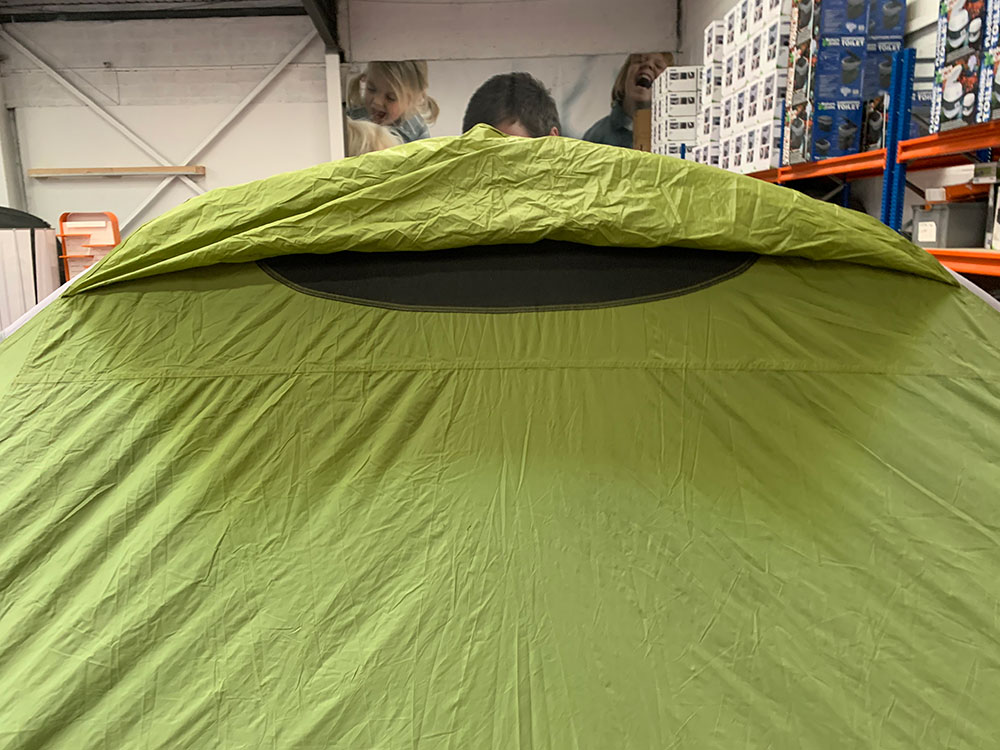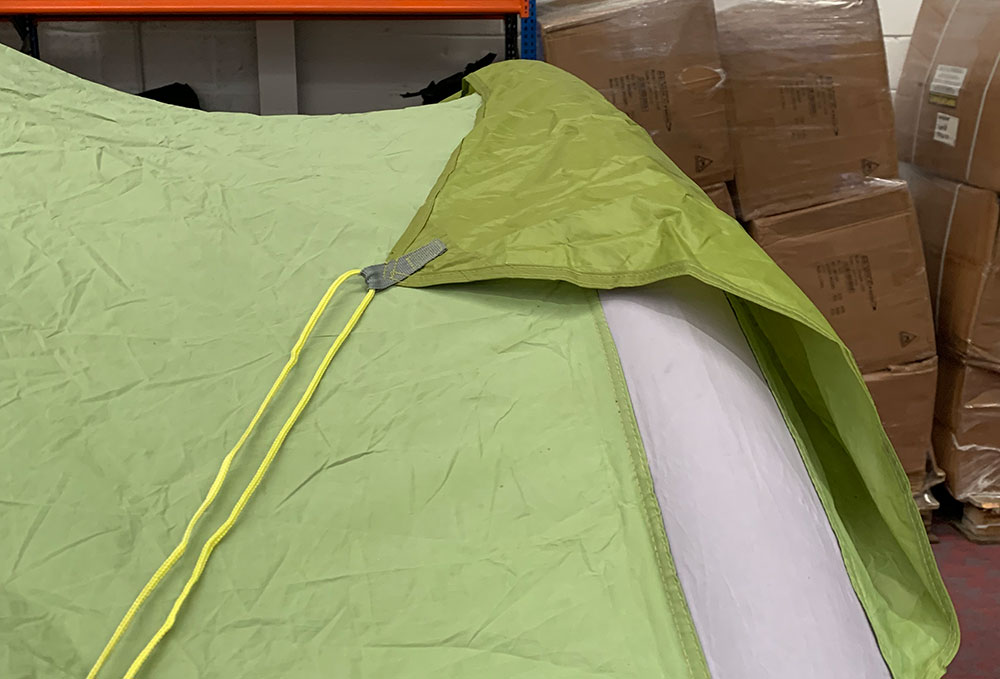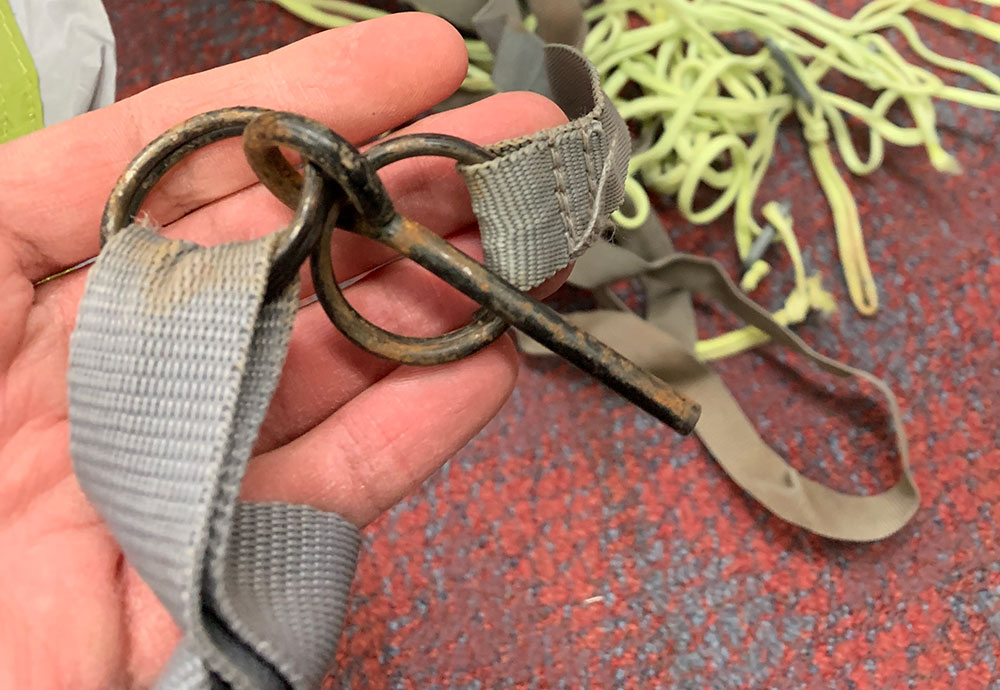
Scroll to the base of the content for the video of this tent.
Above you will see, the customer's tent has suffered extensive fading (and no that is not a shadow!) It is where some of the rear tent panel has been shaded by the mesh ventilation cover.
This is the effects of UV degradation on a lightweight, 70-Denier polyester tent. This blog goes on to explain why this happens, and why no manufacturer will cover it under warranty.
This tent was examined by the manufacturer who quickly diagnosed the issue was UV degradation, the tent has also been examined by ourselves, and there can be no doubt, this is not a warranty issue in any way, shape or form. It is unrepairable as a result.
What is UV Degradation?
UV degradation refers to the breaking down of fabrics and materials, when exposed to ultraviolet radiation, due to exposure to the sun. Long term exposure to sunlight, can cause fabric such as polyester to degrade, beginning to rip, tear and become very brittle.
Why Do Manufacturers not cover UV Degradation Under Warranty?
UV degradation is a sign the product has reached a natural end to it's lifetime. There are different fabrics, different thicknesses of fabric, and treatments to help protect against exposure to sunlight. However, given time, the sun will do it's job in breaking down those materials, to the point where they become unstable.
If a tent has suffered UV degradation, chances are it has been used to the point where its lifetime is ending, or it has been permanently pitched. Tents are a temporary shelter, and they are not designed to be left long-term pitched, unless they are specifically designed for residential pitches, and use harder wearing fabrics such as 100% cottons, which can take exposure to UV light on a longer-term basis.
The product in this photo, and case is a 70 Denier Tent. 70 Denier tents are designed for shorter term, lightweight adventure camping. They are not designed to be left for long term pitching. 70 Denier is a great product, but its a weekend, summer product, and should be used as such.
UV Degradation Photos & Examples:
Photo 1:

As seen in the headline image, this is the rear tent panel, you will see the flap that covers the mesh section has been folded back, to reveal the true extent of this tent's degradation.
Photo 2:

Underneath the mesh cover, you can compare the colours of the fabrics, and how they would have looked before UV exposure, and after UV exposure.
Photo 3:

This shows the steel pins, which have all rusted, and show signs of long term usage.
How Long Should My Tent Last?
The magic question, how long should a tent last? The truth is, it all depends, what kind of weather it is used in, and how well treated it is. A car will not last all that long if it is not serviced, and well looked after. A tent is no different.
The tent in these photos, and video is an entry-level family tent. It is designed with the lightest fabric we sell - 70 Denier polyester fabric, which does not have the extensive Colourlok treatment, which Vango apply to their more elite collections of tents and awnings.
In my experience, of 20 years of selling, examining and working around tents. I would say the average lifetime for 70 Denier tents is 8-10 weeks, in UK outdoor fair weather conditions. If I had an outdoor display, I would definitely be replacing them after this time period. Now this may not sound a long time, but if you use that tent for weekends away, shorter term camping trips - as designed to do - around 2 weeks per year use, you should get four years out of it.
How Can I Lengthen The Lifetime of my 70-Denier Tent?
There are treatment options, which can extend the lifetime to 10-15 weeks, if the tent is really well looked after.
- Apply UV Guard every 12-24 months or when the fabric is starting to fade - this will add a layer of UV protection to the tent fabric. Almost like putting sunscreen on.
- Don't leave the tent permanently pitched
- Pack the tent away dry, to avoid decomposing the fabric in storage.
70-Denier Tents:
Let me emphasize, 70 Denier tents are excellent products, and there is nothing wrong with the product at all.
70 Denier tents are made by all manufacturers we deal with, but they are a lighter weight of tent, made for summer and adventure camping. Yes there are different depths, and quality of product, and the one in the photos is the entry-level 70 Denier, which is the lightest weight.
Returns Statistics:
Out of all the 70-Denier tents we have sold into the marketplace over the last 12 months through one specific brand, I worked out the returns rate for UV degradation, being the diagnosed as the main issue.
The rate as a percentage is 0.175% as of 17th November, 2021. This equates to 7 out of 4000 tents sold as an example.
